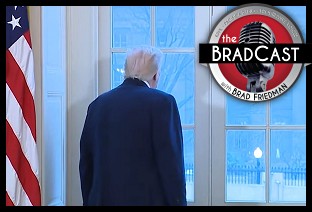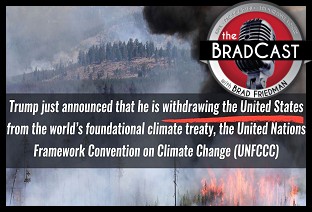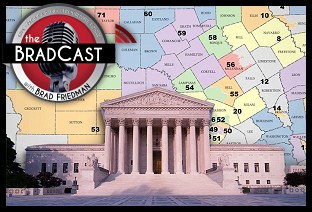 We've been joined countless times over the years on The BradCast by renowned Penn State climate scientist DR. MICHAEL E. MANN. Given the circumstances, he is always remarkably optimistic. Today, there was really something for him to be optimistic about. [Audio link to full show is posted below this summary.]
We've been joined countless times over the years on The BradCast by renowned Penn State climate scientist DR. MICHAEL E. MANN. Given the circumstances, he is always remarkably optimistic. Today, there was really something for him to be optimistic about. [Audio link to full show is posted below this summary.]
The U.S. Senate held its first hearings on climate change 36 years ago --- led by a Republican Senator from Rhode Island at the time --- and attended by a then new Senator from Tennessee by the name of Al Gore. They were warned, as Washington Post's front page reported at the time, that pollution from the burning of fossil fuels would result in a "greenhouse effect" that would cause the globe to warm "to a level which has not existed on Earth in the past 100,000 years."
Two years later, in 1988, they were warned again by NASA scientist, Dr. James Hansen, that evidence was found that the warming had already begun. "The global warming is now large enough that we can ascribe, with a high degree of confidence, a cause and effect relationship to the greenhouse effect."
"There is no longer any significant difference of opinion within the scientific community about the fact that the greenhouse effect is real and already occurring," Gore made clear at the time, following a conference held in 1985 in Austria which concluded that "as a result of the increasing greenhouse gases it is now believed that in the first half of the next century (21st century) a rise of global mean temperature could occur which is greater than in any man’s history."
Long story short, pretty much everything the scientists warned about has come to pass, much of it even sooner than predicted. And yet, over the ensuing decades the fossil fuel industry has fully captured the Republican Party to the extent that not a single one of them voted over the weekend for the most substantive climate bill ever adopted by the U.S. Senate. The only such bill ever adopted by the Senate, in fact. It only took 36 years, and a tie-breaking vote from the Democratic Vice President, but they did it.
On Sunday, after 16-hours of overnight debate and attempted amendments, the Senate passed the dubiously-named Inflation Reduction Act, so named largely to win the vote of coal state Democratic Sen. Joe Manchin. The spending bill will do a lot, including allowing Medicare to negotiate prescription drug prices; put a $,2000 annual cap on prescription drug costs for seniors on Medicare; put a $35/month cap on insulin costs for those on government insurance who have diabetes (Republicans forced Dems to kill that provision for those with private insurance); add a new 15% minimum tax on corporations whose annual profits are more than one billion dollars; tax major corporations for buying back their own stock instead of investing in their companies; and it will also pay down the deficit by hundreds of millions of dollars over the next ten years.
But, most importantly, the Act will invest at least $370 billion to combat climate change with incentives for individuals, states and business alike. It will, according to Senate Majority Leader Chuck Schumer and Manchin --- and several independent analyses --- cut the greenhouse gas emissions we were warned about decades ago, by about 40% by 2030.
"It is a good day, let's not make any bones about that," says Mann today on the show. "This is, by far, the most aggressive climate legislation --- in fact, the only meaningful climate legislation that has ever passed the U.S. Senate."
"Let's be clear: this isn't the solution. It's not like we've solved the climate crisis. There's a whole lot more work that's left to be done," the author of more than160 peer-reviewed and edited scientific publications and author of more than half a dozen books on the climate crisis tells us. "We need at least 50% reductions by [2030] if we are to stay on course to keeping warming below a really catastrophic 3 degrees Fahrenheit. So there's a lot more work to be done, and there are some things in the bill that some of us wish weren't there. There are some incentives for fossil fuel interests when it comes to drilling leases and pipeline construction, a few bones that were thrown in to get the support of a coal-state Democratic Senator in Joe Manchin." Nonetheless, the bill --- which still must pass the Democrat-controlled House on Friday --- "represents significant progress."
"If you want more progress, if you want more aggressive legislation --- and I certainly do and I think we should expect it --- then we need a larger majority in the U.S. Senate that can pass more aggressive climate legislation," Mann explains. In fact, not one single Republican voted for the measure. It was passed with the barest of majorities. All 50 Senators who caucus with the Democrats (and who, shockingly, stayed unified), plus the vote of the Vice President Kamala Harris.
Mann discusses both the upsides and downside of the bill, including the measures that could expand the use of fossil fuels in order to win the vote of Manchin. But, he asserts, the "carrots" to get off of fossil fuels, as included in the bill, are likely to become "sticks". "If the carrot works, it becomes a stick. Which is to say, if we incentivize renewable energy enough, then fossil fuel energy is no longer competitive."
Of course, he's got much more insight on the measure and what needs to be done moving forward. But it's a start that is "real" and "tangible." he argues. And it only took 36 years to get here --- not a moment too soon.
We open up the phones to some thoughts from callers on all of this today and, of course, our own Desi Doyen has a few as well. A "good day" indeed. We'll take it.
(Snail mail support to "Brad Friedman, 7095 Hollywood Blvd., #594 Los Angeles, CA 90028" always welcome too!)
|


 'Green News Report' 1/20/26
'Green News Report' 1/20/26
 Sunday 'Domestic Terrorist' Toons
Sunday 'Domestic Terrorist' Toons 'A Cornered Rat is a Dangerous Rat': Trump Terrorizes Minn., Menaces NATO, World: 'BradCast' 1/15/26
'A Cornered Rat is a Dangerous Rat': Trump Terrorizes Minn., Menaces NATO, World: 'BradCast' 1/15/26 'Green News Report' 1/15/26
'Green News Report' 1/15/26 'This Isn't Close to Over': Mad King Trump in Venezuela (and Beyond): 'BradCast' 1/14
'This Isn't Close to Over': Mad King Trump in Venezuela (and Beyond): 'BradCast' 1/14 Things Getting Weirder as Trump Keeps Losing: 'BradCast' 1/13/26
Things Getting Weirder as Trump Keeps Losing: 'BradCast' 1/13/26 'Green News Report' 1/13/26
'Green News Report' 1/13/26 After ICE Murder in MN, Local Cops Disown Fed Policing Practices: 'BradCast' 1/12/26
After ICE Murder in MN, Local Cops Disown Fed Policing Practices: 'BradCast' 1/12/26 Sunday 'Ice Age' Toons
Sunday 'Ice Age' Toons 'Green News Report' 1/8/26
'Green News Report' 1/8/26 Trump to Congress, Climate, U.N., Rule of Law: DROP DEAD - 'BradCast' 1/8/26
Trump to Congress, Climate, U.N., Rule of Law: DROP DEAD - 'BradCast' 1/8/26 'Nonsense': Trumpers Claim 315k Fraudulent GA Votes in 2020: 'BradCast' 1/7/26
'Nonsense': Trumpers Claim 315k Fraudulent GA Votes in 2020: 'BradCast' 1/7/26 Jack Smith Testimony on Trump J6 Crimes, DOJ Weaponization: 'BradCast' 1/6/26
Jack Smith Testimony on Trump J6 Crimes, DOJ Weaponization: 'BradCast' 1/6/26 Trump War on Venez. is About Ego, Power, 'Alien Enemies Act': 'BradCast' 1/5/26
Trump War on Venez. is About Ego, Power, 'Alien Enemies Act': 'BradCast' 1/5/26 Have a Holly Jolly Somehow
Have a Holly Jolly Somehow Old Man Shouts at People from WH for 20 Minutes: 'BradCast' 12/18/25
Old Man Shouts at People from WH for 20 Minutes: 'BradCast' 12/18/25 SCOTUS' How-To on Gerrymandering on 'Eve' of Election Year: BradCast' 12/17/25
SCOTUS' How-To on Gerrymandering on 'Eve' of Election Year: BradCast' 12/17/25 Bricks in the Wall: 'BradCast' 12/16/25
Bricks in the Wall: 'BradCast' 12/16/25
 VA GOP VOTER REG FRAUDSTER OFF HOOK
VA GOP VOTER REG FRAUDSTER OFF HOOK Criminal GOP Voter Registration Fraud Probe Expanding in VA
Criminal GOP Voter Registration Fraud Probe Expanding in VA DOJ PROBE SOUGHT AFTER VA ARREST
DOJ PROBE SOUGHT AFTER VA ARREST Arrest in VA: GOP Voter Reg Scandal Widens
Arrest in VA: GOP Voter Reg Scandal Widens ALL TOGETHER: ROVE, SPROUL, KOCHS, RNC
ALL TOGETHER: ROVE, SPROUL, KOCHS, RNC LATimes: RNC's 'Fired' Sproul Working for Repubs in 'as Many as 30 States'
LATimes: RNC's 'Fired' Sproul Working for Repubs in 'as Many as 30 States' 'Fired' Sproul Group 'Cloned', Still Working for Republicans in At Least 10 States
'Fired' Sproul Group 'Cloned', Still Working for Republicans in At Least 10 States FINALLY: FOX ON GOP REG FRAUD SCANDAL
FINALLY: FOX ON GOP REG FRAUD SCANDAL COLORADO FOLLOWS FLORIDA WITH GOP CRIMINAL INVESTIGATION
COLORADO FOLLOWS FLORIDA WITH GOP CRIMINAL INVESTIGATION CRIMINAL PROBE LAUNCHED INTO GOP VOTER REGISTRATION FRAUD SCANDAL IN FL
CRIMINAL PROBE LAUNCHED INTO GOP VOTER REGISTRATION FRAUD SCANDAL IN FL Brad Breaks PA Photo ID & GOP Registration Fraud Scandal News on Hartmann TV
Brad Breaks PA Photo ID & GOP Registration Fraud Scandal News on Hartmann TV  CAUGHT ON TAPE: COORDINATED NATIONWIDE GOP VOTER REG SCAM
CAUGHT ON TAPE: COORDINATED NATIONWIDE GOP VOTER REG SCAM CRIMINAL ELECTION FRAUD COMPLAINT FILED AGAINST GOP 'FRAUD' FIRM
CRIMINAL ELECTION FRAUD COMPLAINT FILED AGAINST GOP 'FRAUD' FIRM RICK SCOTT GETS ROLLED IN GOP REGISTRATION FRAUD SCANDAL
RICK SCOTT GETS ROLLED IN GOP REGISTRATION FRAUD SCANDAL VIDEO: Brad Breaks GOP Reg Fraud Scandal on Hartmann TV
VIDEO: Brad Breaks GOP Reg Fraud Scandal on Hartmann TV RNC FIRES NATIONAL VOTER REGISTRATION FIRM FOR FRAUD
RNC FIRES NATIONAL VOTER REGISTRATION FIRM FOR FRAUD EXCLUSIVE: Intvw w/ FL Official Who First Discovered GOP Reg Fraud
EXCLUSIVE: Intvw w/ FL Official Who First Discovered GOP Reg Fraud GOP REGISTRATION FRAUD FOUND IN FL
GOP REGISTRATION FRAUD FOUND IN FL

































